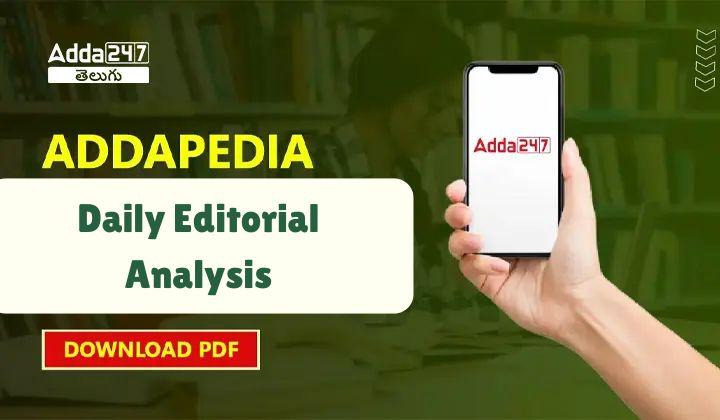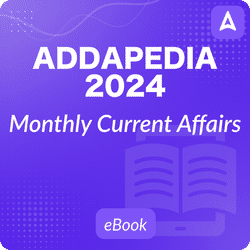Addapedia Editorial: Daily News Editorial PDF, 24 July 2024: Hello Aspirants ADDA 247 is back with Editorial Analysis in English. your daily source for in-depth news coverage and insightful editorial analysis. In this section, we bring you a comprehensive look at the latest national and international events, current affairs, and the historical context behind today’s most pressing topics. Our goal is to provide you with a well-rounded perspective on the news, helping you to understand not just the headlines, but the intricate details and background that shape the world we live in. This ADDAPEDIA Editorial Analysis will help you in understanding the National and International events Current affairs and the background of a particular topic. This comprehensive News analysis will help you in Clearing CA and Interview for many exams.
Adda247 APP
A case for regulating gig-based work
The Karnataka government’s intent to introduce a legislation for the welfare of gig workers is a welcome and necessary step.
It squarely addresses the three big myths propagated by the gig and platform industry.
What are the three myths about gig work?
- Myth 1: Gig workers have “no boss” and are “partners” or “captains”
- There is a big boss — the algorithm and a network of team managers deployed at the local level to enforce the algorithm
- Algorithms dictate the number of hours the worker needs to put in, the orders to be delivered, and rating scores that ought to be maintained for continuous allocation of work.
- Myth 2: Gig workers enjoy flexible work arrangements
- All flexibility in truth rests only with the employer and none with the worker.
- Workers have to comply with mandatory login hours to be eligible for incentives. If they log in after gaps of being ‘inactive’, they have to make peace with disadvantaged rate cards and incentive schemes
- Myth 3: Gig workers are ‘part-time’ workers engaging in platform-based work for additional income.
- 96% of the cab drivers surveyed, secured 100% of their daily income from gigs.
- Average daily work hours for taxi drivers was in excess of 11 hours, and 10 hours for delivery workers.
What is the significance of the Karnataka government’s proposed legislation?
- Recognizes the role of algorithms and makes aggregators responsible for sharing work allocation parameters. Breaks algorithmic control of companies
- Strengthens workers’ position without classifying them as employees
- Introduces provisions for fair contracts, income security, and the right to refuse work without sanctions
- Makes social security mandatory, acknowledging that many gig workers rely on this work for their primary income
- Addresses the welfare of gig workers and shows how social security should be financed from the market, not just the state
What are potential concerns with legislation for gig workers?
- Economic impact: Such legislation might increase costs for companies, potentially leading to higher prices for consumers or reduced job opportunities for gig workers.
- It is estimated that reclassifying gig workers as employees could increase labor costs for ride-hailing companies by 20-30%.
- Reduced flexibility: Stricter regulations might limit the flexibility that attracts many workers to gig economy jobs.
- Implementation challenges: Enforcing such laws across diverse platforms and work arrangements can be complex and resource-intensive.
- Impact on innovation: Overly restrictive regulations could stifle the development of new platform-based business models. It could slow innovation in the sector.
- Cross-border complications: For companies operating across multiple states or countries, varying regulations can create compliance challenges.
Can you answer the following question?
Examine the challenges faced by gig workers in India and critically analyze the effectiveness of state-level legislations in addressing these issues.
RTE in Private Schools
Maharashtra state government had exempted private schools within one kilometer of government schools from reserving 25% seats for weaker sections as per Right to Education. However, this rule was quashed by Bombay High Court.
Under 12 (1)(C) of Right of Children to Free and Compulsory Education (RTE) Act, 2009, private schools should reserve 25% of seats to children from socio-economically backward sections.
- Students admitted under this quota are given fee concessions, with the state government meant to reimburse private schools for the same.
What are the arguments in favour of reservation in private schools?
- Increased access to quality education: This policy aims to provide underprivileged children access to better-resourced private schools, potentially improving their educational outcomes.
- Social integration: By bringing children from diverse backgrounds together, it promotes social cohesion and reduces societal divisions based on economic status.
- Social responsibility: Proponents argue that private schools, as part of society, have a responsibility to contribute to social welfare and equality in education.
- Balancing state capacity: Given the limited capacity of government schools, involving private schools helps in meeting the large-scale educational needs of the country.
- Tax benefits: Many private schools receive various tax benefits and subsidized land. This policy can be seen as a way for them to give back to society in return for these advantages.
- Fulfilling constitutional obligations: It aligns with Article 21-A of the Indian Constitution, which guarantees free and compulsory education to all children aged 6-14.
What are the concerns or challenges with regard to this provision?
- Implementation issues: Many states have struggled to effectively implement this policy due to administrative challenges and resistance from private schools.
- Financial burden on schools: Private schools argue that the reimbursement provided by the government often doesn’t cover the actual cost of education, leading to financial strain.
- Autonomy concerns: Some see this as government interference in the functioning of private institutions, potentially affecting their autonomy and educational approach.
- Social integration challenges: Some studies have reported instances of discrimination and lack of true integration of RTE-admitted students in private schools.
- Quality concerns: There are worries that this policy might affect the overall quality of education if not implemented properly.
- Exclusion of minority institutions: The Supreme Court exempted minority-run institutions from this provision, potentially limiting its reach and effectiveness.
- Difficulty in verifying eligibility: There have been cases of fraudulent admissions, with economically well-off families misusing the provision.
What were the reasons given by Maharashtra State govt for providing exemption?
- Allowing admission to private schools near the vicinity of government or government aided schools reduce the enrolment in government/ aided schools.
- Private schools and teachers’ organisations have also highlighted that state governments have often failed to reimburse the fees for students admitted through this quota.
- In 2023, the Maharashtra English School Trustees Association (MESTA) threatened to boycott RTE admissions citing pending payments of Rs 1,800 crore in reimbursements.
However, the Bombay High Court had quashed and set aside the Government of Maharashtra notification of exempting private schools.
- It held that the provision was “ultra vires (beyond legal authority) of RTE Act, 2009 and Article 21 of Constitution and declared the notification to be ‘void’.
- It noted that “Section 12 (1) (c) of the RTE Act casts a duty on every unaided school irrespective of its distance from the government/aided schools” and the same is ‘unconditional.’
- While state government argued by noting to ‘save public money’ as it is already spending substantial amounts on expenses for state-run and private schools, the HC noted that the financial constraint cannot come in the way of statutory mandates.
Can you answer the following question?
The 25% reservation for economically weaker sections in private schools under the Right to Education Act has been a subject of debate since its implementation. Critically examine the merits and demerits of this provision.
Download Daily News Editorial PDF
| Adda247 Telugu Home page | Click here |
| Adda247 Telugu APP | Click Here |













